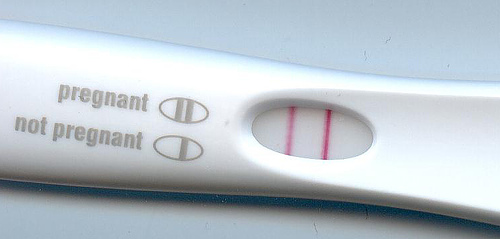
Those two little blue/pink/red lines are just the beginning. Whether this is a long awaited pregnancy, or a little bit of surprise (more than 50% of pregnancies in the US are unplanned), we have tips from those in the know on a healthy pregnancy.
Pat Brown, Manager of Tucson Medical Center’s Newborn Intensive Care Unit, and Margie Letson, TMC for Women Childbirth Educator, had these tips for the newly pregnant expectant mom:
1. If you smoke, please talk to your doctor about a smoking cessation program. Pregnancy can provide a powerful motivator for stop smoking, but ending a smoking addiction is difficult, get help to stop.
Annette Miller MD encourages a healthy varied diet, but reminds us not to ‘eat for two,’ however great the temptation. “Between 2,000 and 2,500 calories is plenty for most women.” It depends on how physically active you are and if you’re carrying twins that adds another, well, little person to the mix. Talk to your physician if you’re unsure.
Those appointments are scheduled for critical times in pregnancy. This isn’t just a case of listening to baby, but also other tests and measures that help ensure a healthy pregnancy and healthy baby. For example, your visits will probably include a urine test. This simple, quick and non-invasive test gives feedback on proteins, ketones, sugars and bacteria and detect, diabetes, bladder or kidney infections, dehydration and preeclampsia.Any of these issues could arise at any point in the pregnancy and the sooner they are dealt with the less impact on you and your child. Margie also suggests marking your calendar or planner with fetal milestones.
That multi-vitamin won’t work unless it includes Folic Acid. Whether you’re trying to get pregnant, not actively trying to prevent pregnancy or in your first trimester of pregnancy, get on the Folic Acid bandwagon. The estimation is that if every pregnant woman took Folic Acid prior to pregnancy and throughout pregnancy neural tube disorders like Spina Bifida and anencephaly would decrease by 70 percent. The Centers for Disease Prevention and Control recommend 400 micrograms per day, and those women who have already had a child with Spina Bifida or other related birth defect are encouraged to up that dose to 4,000 micrograms.
5. Take Childbirth Education Classes
Whether this is your first or your third baby there is always something new to be learned and new fellow parents to meet (and their children could be potential playmates for your little one). Your first class could be Healthy Pregnancy , a free class for first-time parents in their first trimester. We also have classes for those wanting to try for a vaginal birth after a C-Section, and a whole series of basic childbirth classes including a crash weekend course for those who want to squish it all into one weekend.
6. Ignore odd advice or freaky birth stories from strangers at the grocery store or random blogs (TMC blogs are OK!) Pregnancy seems to be an invitation to all sorts of folks known or unknown to share advice and tales of horror. At one level, it demonstrates just how amazing pregnancy is that people want to share some aspect of it, but it can be a little disturbing, along with the uninvited rubbing of your pregnant belly by anyone other than a small child, who can be excused.
7. Know signs of premature labor
- Regular contractions for an hour. This means about 4 or more in 20 minutes, or about 8 or more within 1 hour, even after you have had a glass of water and are resting.
- Leaking or gushing of fluid from your vagina. You may notice that it is pink or reddish. This is called a rupture of membranes, also known as your water breaking. When this happens before contractions start, it’s called premature rupture of membranes, or PROM. When it happens before 37 weeks of pregnancy, it is called preterm premature rupture of membranes, or pPROM.
- Pain that feels like menstrual cramps, with or without diarrhea.
- A feeling of pressure in your pelvis or lower belly.
- A dull ache in your lower back, pelvic area, lower belly, or thighs that doesn’t go away.
- Not feeling well, including having a fever you can’t explain and being overly tired. Your belly may hurt when you press on it.
7. Be prepared. Read the sections of the pregnancy books on interventions, even if you plan to have birth without interventions. Most C-sections are unplanned; best to know just in case, as Julie explains in this post.
8. Know comfort techniques (such as those taught at Healthy Pregnancy class!)
They make a difference. I still use the techniques I learned as meditation in stressful situations.
Which brings us to
9. Avoid excessive stress (physical & emotional)
I know, easier said than done. Talk with your partner, trusted family and friends about how you might do this if you’re likely to get into stressful situations.
10. ENJOY the pregnancy – believe it or not, it will fly past.
Tucson Medical Center offers a FREE Healthy Pregnancy class each quarter, providing consumer-friendly information on nutrition, exercise, fetal development and more. The class should be especially relevant for those in their first trimester of pregnancy, and each session includes a tour of the Labor & Delivery and Mom/Baby units.
Registration is not required.
For information on any of TMC’s Childbirth Education classes, call 324-1817.
![By Klaus Hoffmeier [Public domain], via Wikimedia Commons](https://tmcforwomen.files.wordpress.com/2013/01/pregnancy_test_result.jpg?w=350&h=167)
